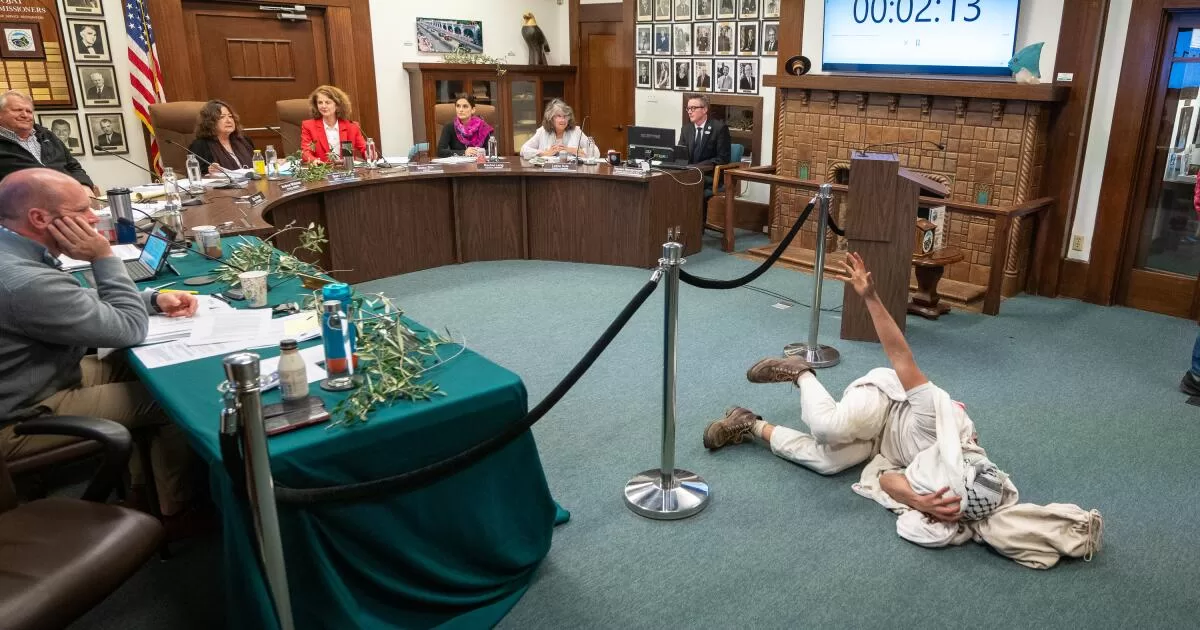The symbolic measure passed on a 3-1 vote, with one councilwoman absent, during a special meeting Monday dedicated solely to the resolution.
The little town of Ojai, population 7,500, joins about 70 U.S. cities that have weighed in on the nearly four-month-old war, according to a Reuters analysis of municipal data. More than 50 of them have passed resolutions calling for a halt to Israel’s Gaza bombardment or advocating more broadly for peace, and at least 20 have condemned the Oct. 7 Hamas attack on Israel that sparked the counteroffensive, the data show.
Ojai’s two-page resolution calls for Congress to demand “an immediate and permanent” cease-fire, for the U.S. to “cease unconditional military aid to Israel,” for Hamas to “release all hostages in Gaza in exchange for an agreed number of political prisoners in Israel” and for “the restoration of food, water, electricity and medical supplies to Gaza,” as well as unrestricted entry for humanitarian aid.
“I believe that it is our moral obligation and responsibility as humans to do everything that we can to reduce suffering of all beings with whom we share this planet,” Mayor Betsy Stix said. Stix voted to pass the measure despite having asked attendees at previous council meetings to limit their comments to local issues.
Health authorities in Gaza say that nearly 30,000 people, mostly women and children, have been killed during Israel’s months-long bombardment. According to the Israeli government, at least 1,200 Israelis were killed and an estimated 250 others kidnapped when Hamas launched its surprise attack on Israeli towns near the Gaza border on Oct. 7.
In recent weeks, City Council meetings in Ojai — a town that has declared itself an “international city of peace” — have been dominated by scores of impassioned speakers, most of them pro-Palestinian, weighing in on the war.
In December, a special council meeting devoted to discussion of a cease-fire resolution was shut down — with no vote — after members of the audience got out of their seats to argue with one another.
On Feb. 13, a regular council meeting was halted by a “die-in” protest by pro-Palestinian activists. Cyrus Mayer, a 29-year-old Ojai resident and landscaper, burst into the room wearing a kaffiyeh head scarf and coated in fake blood. He collapsed to the floor while a woman read names of dead children in Gaza. Police dragged him from the room.
Dozens of people spoke during the 3.5-hour meeting Monday, which in many ways turned into a painful back-and-forth on the legacy of suffering that has resulted from antisemitism and Islamophobia.
Aviva Bernat, a resident, said that the resolution would not protect Israelis or Palestinians and that it was creating only harmful rifts in Ojai.
“There is so much fear,” said Bernat, who is Jewish. “You have brought harm [with] these resolutions and these meetings. We are not sleeping. We are not well. Hear this: We are your Jews. … When we say we are quaking, that we are not safe, that we have a right to survive, I mean it.”
Jody Lewis, a 12-year resident who said she was married to a Jewish man and raised three Jewish children in Ojai, came forward to support the resolution, saying she stood “with so many, including those in Ojai’s Muslim population who have been threatened and feel, frankly, too afraid for their families to appear in public in your chambers.”
Her heart broke, she said, “for the tens of thousands of people killed” since the December council meeting, when it was last considered.
Sheila Cohn, an Ojai resident since 1996, said council members “have wasted numerous hours” and should be doing their job. “Say no to a resolution proposal today and say yes to a resolution to mind your own business and take care of the people who have put their faith in you,” she said.
A high school student spoke of her yearning for a world at peace and for children in Gaza to feel excitement about their future.
Councilman Andrew Whitman, the sole vote against the resolution, called it divisive, especially because the Israeli community considers “cease-fire” to be “a trigger word” and “the equivalent of saying, ‘Lay down your arms and die.’”
Councilwoman Suza Francina said she also had heard “cease-fire” described as a trigger word, as well as people blaming the resolution for contributing to antisemitism. She called that “backward thinking.”
“I think that a cease-fire is the best way to stop or reduce antisemitism,” she said. “The truth is that violence begets violence.”
